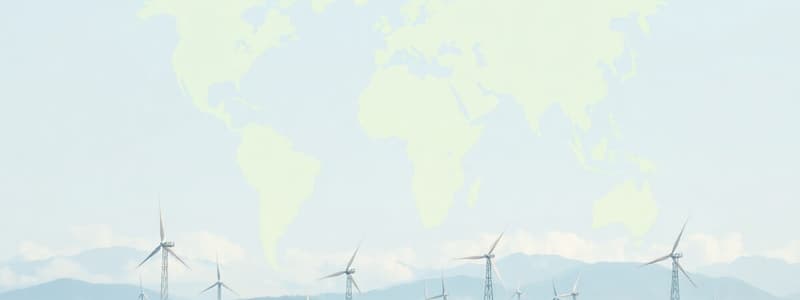Podcast
Questions and Answers
What is primarily responsible for the rise in Earth's average surface temperature over time?
What is primarily responsible for the rise in Earth's average surface temperature over time?
- Natural climate cycles
- Volcanic eruptions
- Solar radiation variability
- Greenhouse effect from human activities (correct)
Which of the following gases is NOT typically classified as a greenhouse gas?
Which of the following gases is NOT typically classified as a greenhouse gas?
- Ozone (O3)
- Methane (CH4)
- Nitrogen (N2) (correct)
- Carbon dioxide (CO2)
What impact does deforestation have on carbon emissions?
What impact does deforestation have on carbon emissions?
- Decreases atmospheric oxygen levels
- Increases carbon absorption capacity
- Increases soil carbon levels
- Decreases CO2 absorption due to fewer trees (correct)
Which of the following is a consequence of ocean acidification?
Which of the following is a consequence of ocean acidification?
Which mitigation strategy focuses specifically on capturing carbon emissions?
Which mitigation strategy focuses specifically on capturing carbon emissions?
What economic impact is likely due to climate change?
What economic impact is likely due to climate change?
What individual action can significantly lower one’s carbon footprint?
What individual action can significantly lower one’s carbon footprint?
What is a key effect of rising global temperatures on weather patterns?
What is a key effect of rising global temperatures on weather patterns?
Flashcards are hidden until you start studying
Study Notes
Definition
- Global warming refers to the long-term increase in Earth's average surface temperature due to human activities, particularly the greenhouse effect.
Causes
- Greenhouse Gases: Emission of gases like carbon dioxide (CO2), methane (CH4), nitrous oxide (N2O).
- Fossil Fuels: Burning coal, oil, and gas for energy releases significant CO2.
- Deforestation: Trees absorb CO2; cutting them down decreases carbon absorption.
- Industrial Processes: Manufacturing contributes to greenhouse gas emissions.
Effects
- Rising Temperatures: Average global temperatures are increasing, leading to extreme weather.
- Melting Ice: Ice caps and glaciers are shrinking, contributing to rising sea levels.
- Sea Level Rise: Increased water from melting ice and thermal expansion of water threatens coastal communities.
- Ocean Acidification: Absorption of CO2 by oceans changes water chemistry, affecting marine life.
- Ecosystem Disruption: Species migration and extinction risks due to habitat changes.
Consequences
- Weather Patterns: Increased frequency and intensity of storms, droughts, and floods.
- Health Risks: Heat-related illnesses and respiratory issues due to poor air quality.
- Food Security: Altered agricultural productivity impacting food supply.
- Economic Impact: Damage to infrastructure, increased disaster recovery costs.
Mitigation Strategies
- Renewable Energy: Transition to solar, wind, and hydroelectric power.
- Energy Efficiency: Improving energy use in buildings, vehicles, and industries.
- Carbon Sequestration: Techniques to capture and store carbon emissions.
- Afforestation: Planting trees to absorb CO2 from the atmosphere.
- Policy Initiatives: International agreements like the Paris Agreement aim to limit global temperature rise.
Individual Actions
- Reduce, reuse, recycle to minimize waste.
- Opt for public transportation, biking, or walking.
- Support local and sustainable products.
- Reduce meat consumption to lower carbon footprint.
Global Warming: Definition and Causes
- Global warming describes the long-term increase in Earth's average surface temperature, primarily caused by human activities enhancing the greenhouse effect.
- Greenhouse gas emissions, notably carbon dioxide (CO2), methane (CH4), and nitrous oxide (N2O), are the primary drivers.
- Burning fossil fuels (coal, oil, gas) for energy is a major source of CO2 emissions.
- Deforestation reduces the planet's capacity to absorb CO2, exacerbating the problem.
- Industrial processes contribute significantly to overall greenhouse gas emissions.
Global Warming: Effects and Consequences
- Rising global temperatures lead to more frequent and intense heatwaves and extreme weather events.
- Melting ice caps and glaciers contribute significantly to rising sea levels, threatening coastal populations.
- Sea level rise, stemming from both melting ice and thermal expansion of water, poses a major threat to coastal communities and infrastructure.
- Ocean acidification, caused by increased CO2 absorption by oceans, disrupts marine ecosystems and biodiversity.
- Ecosystem disruption includes changes in species distribution, habitat loss, and increased extinction risks.
- Altered weather patterns include more frequent and intense storms, droughts, and floods.
- Increased heat-related illnesses and respiratory problems due to worsening air quality are significant health consequences.
- Food security is threatened by changes in agricultural productivity and growing conditions.
- Economic impacts include damage to infrastructure, increased disaster relief costs, and disruptions to various sectors.
Global Warming: Mitigation and Individual Actions
- Transitioning to renewable energy sources (solar, wind, hydro) is crucial for reducing reliance on fossil fuels.
- Improving energy efficiency in buildings, transportation, and industries can significantly reduce emissions.
- Carbon sequestration technologies aim to capture and store carbon dioxide emissions from various sources.
- Afforestation and reforestation efforts help increase carbon absorption from the atmosphere.
- International agreements, such as the Paris Agreement, set targets for reducing greenhouse gas emissions and limiting global temperature rise.
- Individual actions like reducing, reusing, and recycling waste can lessen environmental impact.
- Choosing public transport, cycling, or walking over driving reduces carbon emissions.
- Supporting local and sustainably produced goods minimizes transportation emissions and environmental impact.
- Reducing meat consumption can lower an individual's carbon footprint, as livestock farming contributes significantly to greenhouse gas emissions.
Studying That Suits You
Use AI to generate personalized quizzes and flashcards to suit your learning preferences.




